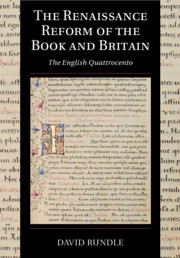
The Renaissance Reform of the Book and Britain
The English Quattrocento
Series: Cambridge Studies in Palaeography and Codicology; 17;
- Publisher's listprice GBP 38.00
-
18 154 Ft (17 290 Ft + 5% VAT)
The price is estimated because at the time of ordering we do not know what conversion rates will apply to HUF / product currency when the book arrives. In case HUF is weaker, the price increases slightly, in case HUF is stronger, the price goes lower slightly.
- Discount 10% (cc. 1 815 Ft off)
- Discounted price 16 339 Ft (15 561 Ft + 5% VAT)
Subcribe now and take benefit of a favourable price.
Subscribe
18 154 Ft

Availability
Estimated delivery time: In stock at the publisher, but not at Prospero's office. Delivery time approx. 3-5 weeks.
Not in stock at Prospero.
Why don't you give exact delivery time?
Delivery time is estimated on our previous experiences. We give estimations only, because we order from outside Hungary, and the delivery time mainly depends on how quickly the publisher supplies the book. Faster or slower deliveries both happen, but we do our best to supply as quickly as possible.
Product details:
- Publisher Cambridge University Press
- Date of Publication 18 March 2021
- ISBN 9781316644201
- Binding Paperback
- No. of pages380 pages
- Size 244x169x21 mm
- Weight 660 g
- Language English
- Illustrations 24 b/w illus. 16 colour illus. 146
Categories
Short description:
Reform of the script was central to the humanist agenda - this book suggests a new explanation of its international success.
MoreLong description:
What has fifteenth-century England to do with the Renaissance? By challenging accepted notions of 'medieval' and 'early modern' David Rundle proposes a new understanding of English engagement with the Renaissance. He does so by focussing on one central element of the humanist agenda - the reform of the script and of the book more generally - to demonstrate a tradition of engagement from the 1430s into the early sixteenth century. Introducing a cast-list of scribes and collectors who are not only English and Italian but also Scottish, Dutch and German, this study sheds light on the cosmopolitanism central to the success of the humanist agenda. Questioning accepted narratives of the slow spread of the Renaissance from Italy to other parts of Europe, Rundle suggests new possibilities for the fields of manuscript studies and the study of Renaissance humanism.
'... an extremely important addition to the growing scholarship on medieval/Renaissance periodization. And it is a champion for the value of manuscript studies and paleography in the pursuit of literary history.' Mimi Ensley, Manuscript Studies: A Journal of the Schoenberg Institute for Manuscript Studies
Table of Contents:
Introduction: the revival of letters and the uses of palaeography; 1. The eloquent page: humanism and script, humanism and England; 2. Humanist script in England: the first ten years; 3. British barbarians in Italy and Scotland's first humanist; 4. The Dutch connexion: the significance of low countries scribes from Theoderic Werken to Pieter Meghen; 5. The Butcher of England and the learning of Italy: John Tiptoft, Earl of Worcester and the 'pupils of Guarino'; 6. The victory of italic in diplomatic correspondence; 7. Conclusion: beyond humanism, beyond words.
More



